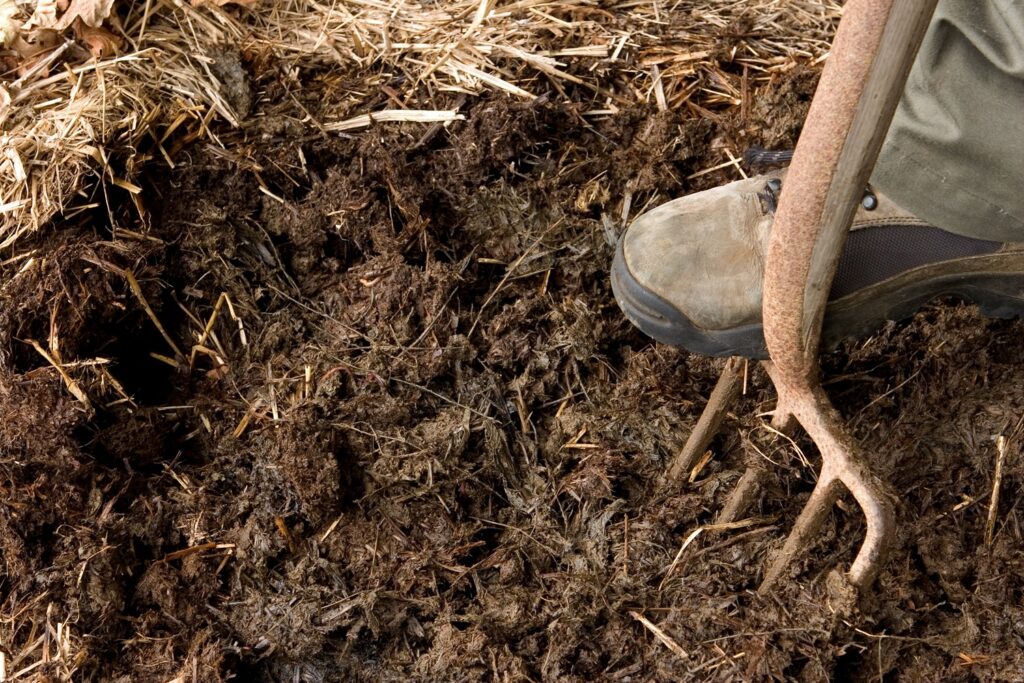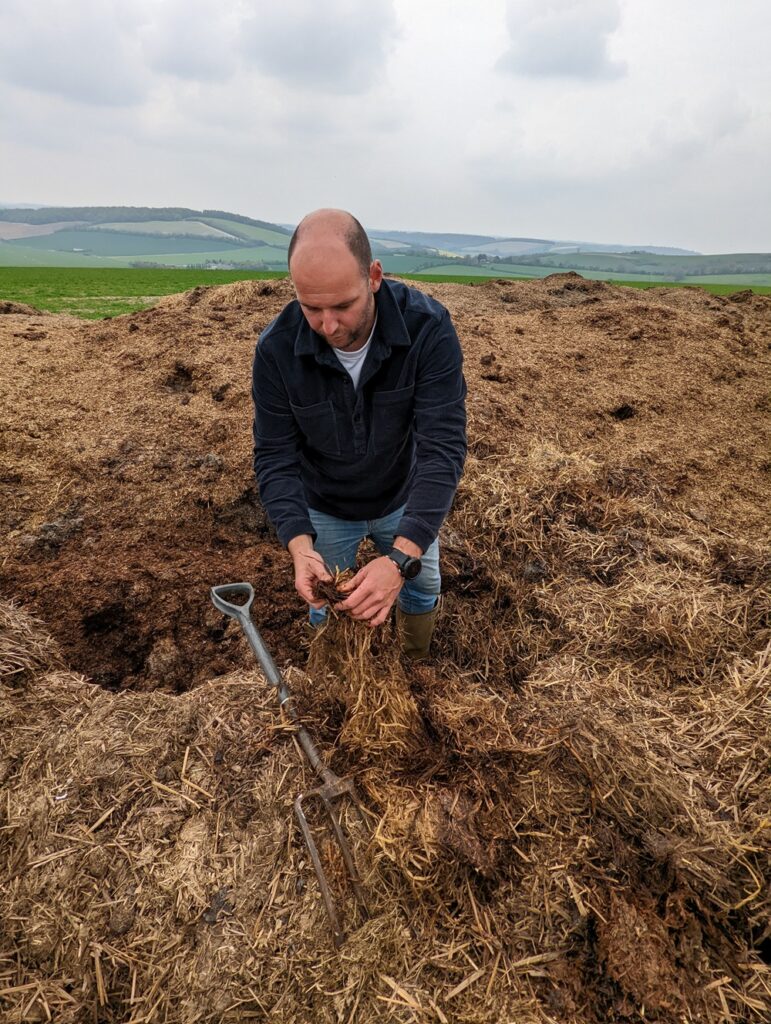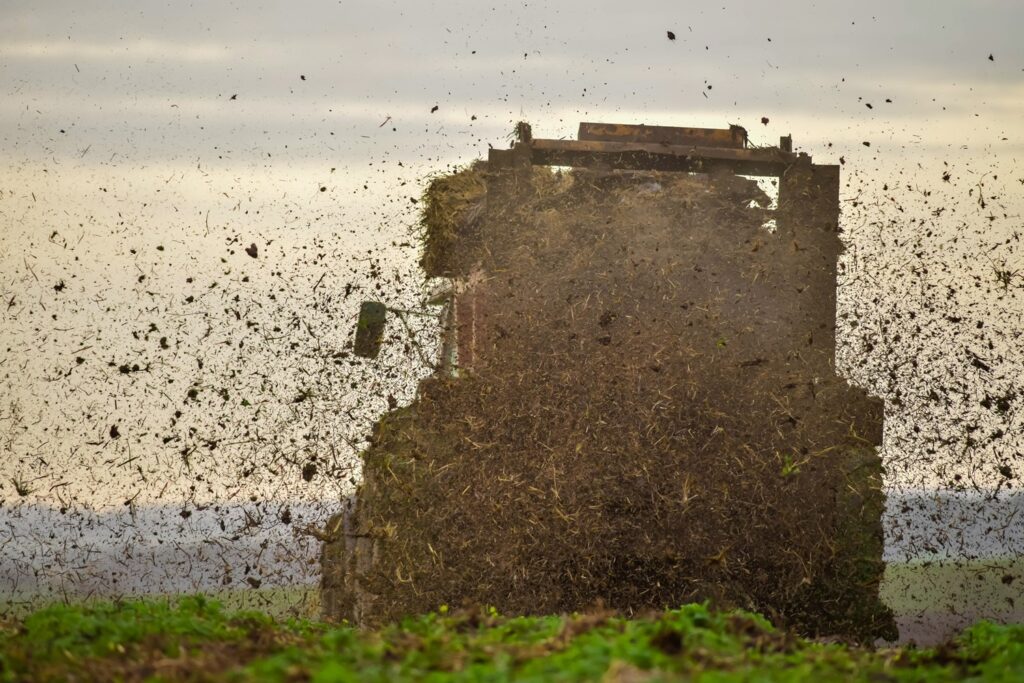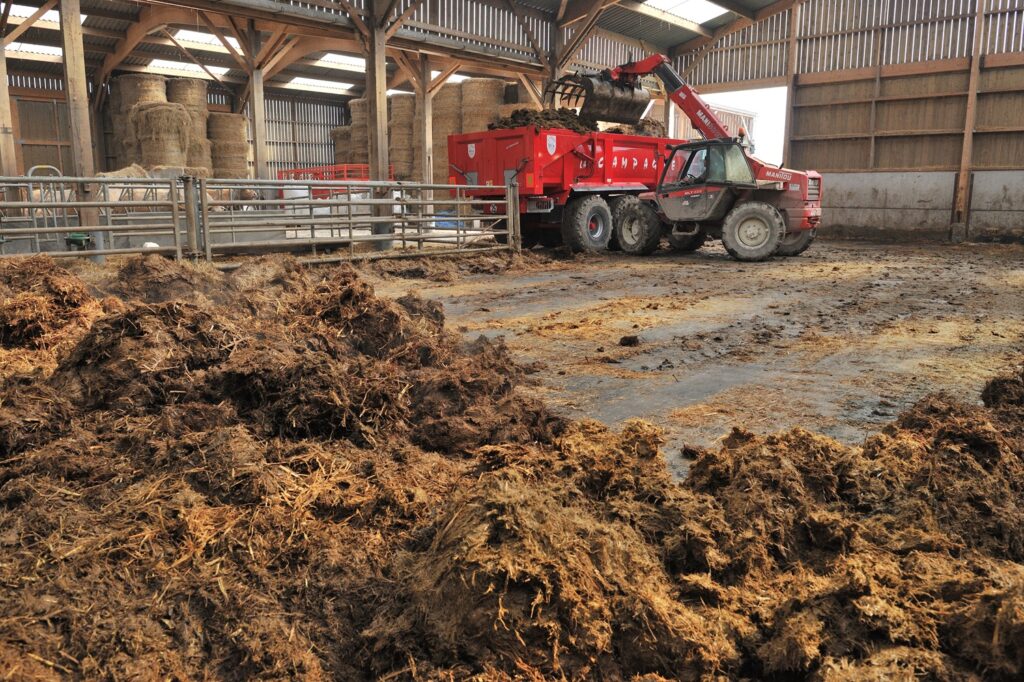My name is Andrew Sincock and I grew up on my grandparents mixed Dairy, Beef and Arable Farm in Cornwall. My first job on the farm was mucking out an old stable that served as a temporary home for new mothers and their calves. The stable was 3 meters wide, roughly 6 meters long and would only be cleaned out once a year. It was regularly bedded with fresh straw, so by the time it came to mucking out, it would be at least 3 feet deep. The entrance to the stable was too narrow for any machinery, so it would be left to me to clean out by hand while I was on my summer holidays.
I did this for several years until I was strong enough to break two long-handled wooden pitchforks while trying to take too much at once. I was convinced I had outgrown this job and would progress to cleaning out calving pens in the loader tractor. You can imagine my disappointment when Geoff, our local handyman, was asked to weld a metal bar to the fork instead of a wooden handle. I was
mortified.
Being the stubborn bugger I am though, I was convinced I could break this one too. Try as I might, I couldn’t even get it to bend, let alone break! My Grandad and Uncle would watch me sweating and joke that I would one day receive an award for looking after my pitchfork, just like Trigger did for looking after his broom! What was it, 17 new heads and 14 new handles? Anyway, here I am, almost 30 years later, undertaking a Nuffield Scholarship looking at different Organic Manure management options. I am not sure my younger self would approve.
Although my childhood experience had no bearing on my current Nuffield Farming Scholarship study title, I can appreciate the irony. What I am also aware of, with hindsight, was my complete ignorance in regards to organic manures and their value. This is the real reason why I have chosen to study organic manures and I am hoping that my final report and presentation will remind people of just how valuable they are. When I speak to farmers now, as part of my day job, I always ask which is their best field and is that field the best because historically it has had the most organic manure applied?

The answer is almost always “Yes!”. Unsurprisingly, it’s usually the field closest to the yard. I believe the value of organic manure was likely realised by the first ever farmer. I am sure the farmer would have noticed that wherever their animals ‘did their business’ the grass would always grow back quicker and greener. You still see it today. Fields are grazed, cow pats are left and sure enough, little green tuffs of grass grow up out of the cow pats quicker than the surrounding area. It would have been a small leap from realising this and using the cow pats to feed growing vegetables and arable crops. Still today, remote African and Indian communities are using cow pats and urine to create fertilisers.
What caused developed countries to move away from valuing and using organic manures? I believe it started with the availability of cheap synthetic mineral fertilisers, the development of chemical plant protection products and the advances in plant breeding, post WW2 world. Don’t get me wrong, these advances helped feed a hungry world and were very welcome but we now know
better. Ironically, this progress started what later became know as the ‘Green Agricultural Revolution’. One tonne of fresh cattle manure with 25% dry matter, according to RB209 and the latest AHDB fertiliser prices, contains £16 in Nitrogen, Phosphorus and Potassium (NPK). When you consider the value of Carbon, Magnesium, Zinc, Calcium and all the other trace elements, your one tonne of fresh cattle manure could be worth upwards of £50. During the peak fertiliser prices in 2022, the same one tonne was worth well over £100!
I would go so far as to say that the lack of value placed on organic manures and in some instances the move away from mixed farming has contributed to the degradation of our soils. This is demonstrated perfectly by the organic matter percentages of the predominately arable fields of the east of the UK, compared to the mixed farming and livestock producing west. By putting a value on your organic manures, what you may have previously considered a by-product, once again has value. That value on paper may be significant, but, the real value of organic manures may not be realised this year or even next year. Just as you and your farm is now benefitting from the historical applications of organic manures, generations to come will benefit from organic manure applications applied today.

What is the old quote, “If I knew the world was going to end tomorrow, I’d plant a tree today”. The principles are the same, organic manures applied today will benefit you, your soils and your farming enterprise, but not nearly as much as they will benefit the next generation. This is why I value organic manures so much and why I wanted to do a Nuffield Farming Scholarship on the topic. You might not see significant or instant returns from improving or even regenerating your soils, but your children will.
Regular and significant organic manure applications over a number of years will lead to an increase in soil organic matter (SOM) and soil organic carbon (SOC). Combine applications of organic manure with min-till practices, cover crops, herbal leys, mob grazing and cattle grazing and you’ll accelerate the increase in SOM and SOC. This method of farming, and the subsequent increases in SOM and SOC, have been coined ‘Carbon Farming’. This term is one I recently encountered at the annual Nuffield Farming Conference held at Sandy Park in Exeter. For anyone who hasn’t been to a Nuffield Conference before, you should. It was such an enjoyable, inspiring, and informative couple of days that I highly recommend attending if you ever get the chance.
There was one particular session that got me thinking more than the others and it relates to carbon farming and my own particular topic. The session was titled “Regeneration and Net Zero,” and the scholars presenting were:
• Sam Smith – ‘Regenerative agriculture: a shared ambition for the future of farming?’
• Ben Hunt – ‘Can you farm carbon?’
• Chris Taylor – ‘Do Regenerative farming practices pave the way for UK agriculture to meet Net Zero?’
The presentations are only 12 minutes long, which is hardly enough time to scratch the surface, let alone delve into the details of what is a minimum of 8 weeks of travel and study. In these 12 minutes, Sam, Ben, and Chris all discussed, either directly or indirectly, regenerative agriculture, the increase in SOM / SOC or Carbon Farming. Sam and Ben approached the topic from a natural capital, carbon credits, and barriers to uptake angle, whereas Chris chose to highlight the soil health benefits and improved resilience—resilience being a word I noted down from all three presentations.

The point I want to make is that in Sam Smith and Ben Hunt’s presentation, they were looking at ways to incentivise farmers for farming carbon. They mentioned some barriers to uptake being the lack of demand, lack of incentives, and lack of information, yet, I cannot help but think that is entirely the wrong way to approach the subject. At the moment, the narrative is around carbon farming to create credits that can be sold, this benefits other industries that know they will never be able to reach Net Zero. Yes, this brings a significant and much-needed injection of money into agriculture, but what happens next? What happens when you need to use those carbon credits to prove you and your farm have reached Net Zero? You may have increased SOM from 3% to 6%, and you may have sold this carbon to an airline, for example. What happens when you need to prove that you too have reached Net Zero and that carbon is no longer yours?
In my opinion, and as Chris Taylor showed in his presentation, carbon farming benefits the soil, the farmer and the next generation. There shouldn’t need to be an incentivise or provide immediate financial reward to motivate a farmer into farming carbon. The increased water holding capacity, improved soil structure, increased soil fertility, and increased microbial activity, should be all the incentive the farmer needs. If that really isn’t enough, maybe the farmer should consider their best field again, why it’s the best field, and who is going to be farming that field next. Every single farmer should forget about farming carbon to sell carbon. Benchmark your SOM and SOC levels today and farm carbon because it’s the right thing to do. Farm carbon because it improves soil health and fertility, as well as the resilience of your whole farming enterprise. Save the resulting carbon credits for the day when you’re asked to prove that you have reached Net Zero. Do not sell your credits to make a quick buck and definitely don’t sell them to make other industries look better at the future expense of our own.
That said, the bit that really interests me is how you go about actually ‘farming carbon’ and my Nuffield topic of organic manures. Photosynthesis is widely considered as THE way to farm carbon. Ensuring you have living and growing plants in your soil at all times, like a cover crop between rotations, will mean said plant is constantly converting energy from the sun, CO2 and H2O into root exudates (liquid carbon), to feed soil biology and essentially sequestering carbon. This, in principle, sounds simple but I said essentially for a reason. The reality is it’s anything but simple, the whole process is highly complex and incredibly nuanced. Unfortunately, there is no silver bullet, and, as Gabe Brown would say, it all depends on context!
If you have introduced cover crops into your rotation, you are increasing the amount of carbon you capture through photosynthesis and root exudates. However, if you then plough and apply 250kgs of ammonium nitrate, you will oxidise and ‘burn off’ a lot of the carbon you have just captured. You’ll be farming carbon and then burning carbon. Almost nothing you do in isolation is going to farm carbon, certainly not to the extent that you can reach Net Zero anyway. The only possible exception to this is a very large application of organic matter. Applying, for example, 100t of Biochar per hectare would probably make a difference, but it’s not realistic or particularly beneficial.
Applications of organic matter or manure are great and I have explained why above, but applications have to be considered carefully or they can have unwanted consequences. This isn’t me scaremongering; it’s the realities of working with a biological system. Over applications can
lead to environmental pollution, nutrient deficiencies, locking up of nutrients / elements, crop contamination as well as compaction and structural damage to the soil from the application itself. There are also questions around the effects on the living organisms within the soil as well. Applying large quantities of liquid slurry can have a negative effect on earth worm populations or fungi for example.
Proceed with caution but make sure you proceed. You are not going to be able to do everything, certainly not all at once, but a small step forward is a step in the right direction. As Emily Padfield, who was also presenting at the Nuffield Conference, quoted, “Do the best you can until you know better. Then when you know better, do better.” I think we can all do better. The Green Revolution suggested that mineral fertilisers, plant breeding and chemical usage was ‘the best’, however, we now know that building soil health and fertility is better. I want to find out what works, what doesn’t and how it can be used in UK Agriculture. My overall aim being to wean us off the artificial chemical inputs and instead build SOM, SOC and improve soil resilience. I want to make sure that the next generation has a best field too.
The truth is, we knew best, and by we I mean the previous generation. They knew they had to build fertility though farming carbon before growing a cereal crop. You just need to read a Newman Turner book to appreciate how much has changed and how far off the path we have strayed. To find new technologies or ‘best practice’ for organic manure management, my original travel plans included New Zealand, Brazil, North America and Europe. However, what I have recently realised is that I actually need to visit developing countries where I am more likely to discover resourceful yet practical ways of processing and utilising organic manures. Countries and economies that have become lazy though high input use are not places where I will discover resourceful yet practical ways of processing and utilising organic manures.
I am looking to the past to discover a way forward and I cannot wait to share my findings with you. For now though, my parting question to you is this, now that we know better, are we going to do better?




